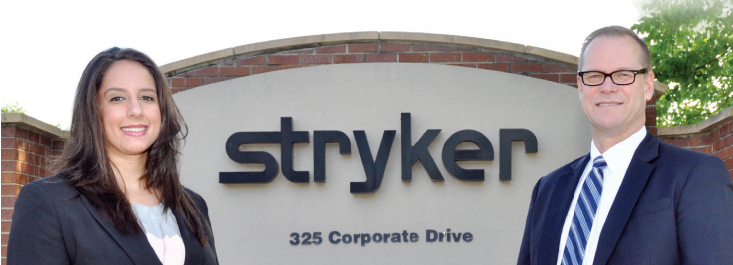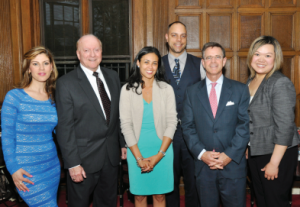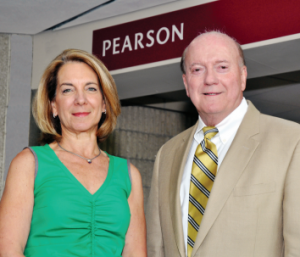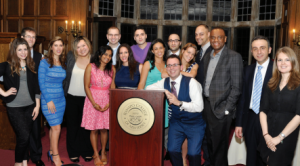- About Ramapo
- Academics
- Admissions & Aid
- Student Life
- Athletics
- Alumni
- Arts & Community
- Quick Links
- Apply
- Visit
- Give
Ramapo College Articles
July 1, 2014Developing Business Solutions
Capstone Consulting Project provides valuable experience for MBA graduates.
When Ramapo College redesigned its Master of Business Administration degree in September 2012, the faculty committee that developed the new MBA curriculum envisioned the Capstone Consulting experience as the culmination of an intensive 20-month course of study. Working in groups of four and five, the students would take on advisory roles with local companies, trying to resolve real-life problems identified by executives. That’s how Jessica Finaldi, who earned an undergraduate business degree from Ramapo in 2011, wound up leading a team of MBA candidates charged with creating a project strategy and marketing plan for a new implant system that helps repair femoral neck fractures of the hip.
Fortunately for Finaldi, the medical technology company to which she was assigned, Stryker Orthopaedics in Mahwah, was her full-time employer (she coordinates training programs that teach healthcare professionals how to use Stryker products). What’s more, the company representative who supervised Finaldi and her teammates was Ken Gavlick, a senior marketing director at Stryker and a 1989 Ramapo graduate.

Developing Business Solutions
On their first day at the Stryker campus, the students attended a five hour training session on the anatomy of hip fractures and the implants and instruments used to repair them. “I ran this program like it was a surgeon education program,” Gavlick said. “It’s really learning a different language. The team needed the technical knowledge to be able to speak confidently about femoral neck fractures.” Over a 10-week period starting in late February, the students met on the Ramapo campus each Thursday night with Adjunct Professor Tom Lambrix, the faculty advisor for the capstone course. “The students put to use what they learned in other MBA courses and directly applied it to a real-life challenge,” Lambrix said. “That’s a win-win for the students and the companies.”
The students also met weekly with their employer representative. At Stryker, Gavlick directed the students to pertinent employees in research and development, sales, marketing, quality control, manufacturing and other business areas. “I gave them a reallife project,” Gavlick said. “They were tasked with developing the marketing portion of the project.” And that’s precisely what MBA Director Timothy Landers had in mind when he recruited local companies to take part in Ramapo’s Capstone Consulting Program. The other participating businesses were Hackensack University Medical Center; Stone Systems, a fabricator of quartz and granite countertops in Passaic, N.J.; and Pearson Education, a publishing company in Upper Saddle River, N.J.

In May, at the climax of their 10-week assignments, the students returned to their company headquarters and delivered their findings to an audience that typically included senior managers. Finaldi’s team gave a 45-minute presentation to Stryker Trauma marketing employees, among them two senior directors of marketing.
“Jess really did take the lead on this thing,” Gavlick said. “What they gave to us is a great foundation, which will allow us to continue to move forward with the project. We are very pleased with the end result. Everybody benefitted in the long run—the students, the school and Stryker.”
Finaldi said the capstone project at Stryker gave her invaluable hands-on experience. “Bringing a product to market in a highly regulated industry is a challenge, and I learned that it is imperative to rely on industry research and subject matter experts in each functional area to point you in the right direction,” she added. “Not only did I get to implement the knowledge that I have gained throughout my MBA program, I was able to practice my leadership skills for the project. It felt good to know that my teammates trusted me to take them in the right direction.”
A Family Connection
For Jessica Finaldi and her two sisters, Ramapo College is a second home. The three siblings—Jessica, her twin sister, Lauren, and oldest sister, Jennifer—have earned four degrees at the undergraduate and graduate levels, with a fifth on the way.
Jessica is the most recent graduate, earning her MBA this spring. She was chosen by her classmates as the MBA Outstanding Student of the Year and was inducted into the Beta Gamma Sigma Business Honor Society (2014). She first came to Ramapo’s campus in fall 2007 and received a B.S. in Business Administration/Management with a minor in Spanish Language Studies. She participated in the RCNJ Cheerleading Program in 2007 and served as Senior Resident Hall Assistant from 2008–2011.

Lauren E. Finaldi graduated in 2011 with a B.S.N. in Nursing. She was the President of Phi Delta Epsilon International Medical Fraternity in 2010–2011 and studied abroad in Sierra Leone, West Africa, through the SA Leone Health Pride. Lauren works at Hackensack University Medical Center and specializes in the treatment of leukemia and lymphoma. She will return to campus this fall to pursue her M.S. in Nursing.
Jennifer started the Finaldi siblings Ramapo tradition, earning a B.A. in Music Industry in 2009, magna cum laude. She interned at Suzi Reynolds & Associates, L.L.C. in Fort Lee, N.J., gaining experience in artist management and marketing, and was captain of the Ramapo tennis team in her junior and senior years. She now works at Stryker with Jessica. As an associate business analyst, Jennifer is responsible for documenting business requirements and working with IT quality and the web development team.
“Ramapo College will always have a fond place in our hearts,” said Jessica. “I’m so thankful for the time the faculty and staff put in to help students succeed. You don’t find this type of drive and passion everywhere.”
Discovering the Unintended
Julie Alexander, a vice president at Pearson Education, supervised a team of five MBA students who were assigned to advise the company on how to price its new (mostly digital) products and services. But the students’ research, Alexander said, showed that price was not always a key factor for customers. “Essentially their recommendation was to focus on other elements they uncovered, such as customer service and the power of the brand to drive sales,” Alexander said. “I appreciated that they had the confidence to move the case in a different direction and maybe share information with the client that the client wasn’t prepared for or may not have considered.”

At Hackensack University Medical Center, students advised the Heart and Vascular Hospital on how to introduce a system of electronic record keeping. They were supervised by Dr. David Landers, vice chairman of the Heart and Vascular Hospital. A cardiologist, David Landers said the project would never have been completed without the Ramapo students. “We did not have the resources to conduct an analysis in-house,” Dr. Landers said. “To bring an analytic skill set that we don’t have in the institution, to bring that to bear, it was a tremendous benefit for the hospital.”
To ensure that each team had the right mix of student expertise, Lambrix worked with the MBA Director Tim Landers. Robert Lascar, the team leader on the medical center’s project, said the team’s positive chemistry made his job easier. “Our team was very lucky to have people with the right business skills and the right mix of personalities,” Lascar said. “We were able to move quickly and get our project and presentation finished effectively and very early.” Lascar recently took a new job as director of information technology for Promotion in Motion, Inc. He earned his B.S. in Information Systems from Ramapo in 2009, summa cum laude, after serving in the military.
A New Focus
In January 2011, shortly after Ramapo’s Anisfield School of Business earned accreditation from the Association to Advance Collegiate Schools of Business, the world’s foremost sanctioning body, Dean Lewis Chakrin set out to reinvent Ramapo’s Master of Business Administration degree to better meet the business challenges of the 21st century. Chakrin convened an ad hoc faculty committee to design a new curriculum from scratch. “Very rarely do you have an opportunity in academia to start with a whiteboard,” said MBA Director Timothy Landers.
After soliciting input from Ramapo alumni and business leaders from across northern New Jersey, the faculty committee devised an accelerated, hybrid program aimed at early-career professionals. “They all became part of this journey to figure out how best to address the needs of working professionals in a fast changing marketplace,” said Landers.

The new curriculum requires MBA candidates to complete two three-credit courses in each of seven consecutive 10-week terms. Students proceed through the 20-month program together as a cohort, attending classes on campus two nights per week while also receiving weekly online instruction. The program emphasizes leadership—the focus of three of the 14 courses—critical thinking and global business, highlighted by a nine-day trip to China with Dr. Huiping Li, an Associate Professor of International Business. “Business professionals need to be aware of different cultures, how the global supply chain works and the geopolitical challenges in a shrinking world,” Landers said. The first cohort of 19 students earned their MBA degrees in May, 2014, and the program has now grown to more than 50 students.
Advice & Counsel
As they dug into their ambitious consulting assignments at four major employers across northern New Jersey in the spring, Ramapo’s 19 MBA candidates met weekly with Tom Lambrix, an adjunct business professor and the faculty advisor for the Capstone Consulting Program. Lambrix helped the students get organized, delegate assignments and establish schedules. And when asked, he offered advice. “Specifically,” Lambrix said, “I offered advice on putting together a first-rate company analysis and presentation. The team had a responsibility to do their part of the project and to present the results to the client.”
Lambrix brought to the role a 30-year career in business and government—he was a senior vice president with a Fortune 100 company and served on the White House domestic policy staff under President Jimmy Carter as well as 10 years of teaching experience at the Anisfield School of Business. As faculty advisor to the Capstone Program, he counseled the MBA teams on how to price online educational materials, how to move medical records to a digital database, how to market a medical device used in hip fractures and how to enhance customer relations for a fabricator of quartz and granite countertops.
“These organizations had real-life issues that they needed help with,” Lambrix said. “The students got a lot of practical experience, in undertaking the role of consultants. They began to understand the complex issues companies face, and they gained experience in oral and written communication, very important skills as they move through their careers.”
Categories: MBA
May 4, 2014In Grad School Admissions, GMAT and GRE are Taking a "Back Seat."

Do standardized tests provide enough insight into an applicant’s academic abilities and their expected success in an MBA program? Some higher education institutions have begun waiving test scores in favor of looking at an applicant’s job experience and academic accomplishments, which studies have shown are better predictors of academic success than standardized test scores alone.
In today’s ever changing job market, the seemingly endless demands on working professionals may limit the number of MBA applicants due to the added time commitment to prepare for the GMAT or GRE exams. And yet, some college administrators worry that standardized tests may conceal more than they reveal, especially among underrepresented groups and those who have been out of school for some time. In fact, relying heavily on a single factor can be counterintuitive to the ultimate goal – identifying qualified candidates who will contribute to the intellectual discourse.
At Ramapo College, MBA Admissions Officers have a number of key predictive variables at their disposal that go well beyond test scores. It is not uncommon for working professionals to return to Ramapo after years of successful employment, providing admissions officers with an objective benchmark of an applicant’s skillset and a window into the type of insights that might be shared in the classroom.
“Students often self select themselves out of the process without realizing the value of their work experience,” says Tim Landers, Director of Ramapo’s MBA Program. Landers adds, “Our small cohort size gives us the advantage of meeting one-on-one with each candidate; there’s no better way to judge whether someone is a good fit for our accelerated program than a face-to-face meeting.” For large MBA programs processing thousands of applications, standardized tests remain an efficient and objective means of evaluation because it puts all applicants on a similar scale.
Undergraduate GPA and academic honors are traditional key predictors of success in graduate school but, for those whose academic career was a distant misbegotten adventure, officers look more closely at the cognitive skills demonstrated through the attainment of professional licenses, memberships in trade associations and, most importantly, professional achievements and levels of responsibility.
Michael DiBartolomeo, Associate Director of Graduate Admissions at Ramapo, explains, “Today’s marketplace demands ever more specialization and regulatory oversight, which is why so many of our applicants arrive with significant milestones in hand, e.g., CPA, Certified Financial Planner, Project Management Professional, LEED Certification, and Six Sigma.”
Graduate Admissions counselors now have greater latitude when considering nonbusiness degree applicants due to the advent of the pre-enrollment boot camps. “Students prefer to spend their time on something directly related to their MBA success rather than on studying for a standardized test that might only be marginally related to the curriculum,” says DiBartolomeo.
Categories: MBA
December 17, 2013Ramapo College MBA Program: Creating Business Leaders with Global Perspective
Technological advances and global competition have changed almost every facet of our economy requiring workers to commit to a path of continuous learning and the development of new skills,” says Tim Landers, Assistant Dean and Director, MBA Program, Ramapo College of New Jersey.
With this changing economy in mind, Ramapo College developed an accelerated, twenty-month MBA program specifically designed with a broad-based curriculum and an emphasis on leadership, versatility, and gaining a global perspective. Emphasizing the importance of global management, second-year students sharpen their international skills during a nine-day trip to China.
“Students need to be aware of the broader issues facing managers and the cultural dynamics of international business. Today, thanks to the Internet, new businesses often begin life with an international footprint,” remarks Mr. Landers. “You can’t graduate with an MBA without an appreciation for what it is like to manage in a global economy.”
The Ultimate Class Trip

The nine-day China Immersion Trip, led by Professor Huiping Li, who teaches Managing Global Business and Global Immersion Experiences, is intended to introduce students to the history, culture and business environment of China through tours and meetings.
The trip takes place in the fall of the second year of the program and is factored into the curriculum and the tuition. Professor Li convenes a mix of colleagues from her Ramapo College MBA Program: Creating Business Leaders with Global Perspective MEADOWLANDSUSA I meadowlands.org I DECEMBER 2013 29 prior experiences working with global companies and Chinese government agency to help students gain a wider perspective on the many international business opportunities there.
This fall, eighteen students participated in the nine-day trip, visiting Beijing and Shanghai.
“The students saw tangible evidence of China’s remarkable economic growth and observed how the country’s history has shaped its society and current business environment for domestic and foreign firms,” says Professor Huiping Li. “China is such an important player in the global economy. The best way for emerging business leaders to understand it is to take them there, so they can see first-hand China’s economic development and meet both foreign and Chinese people working there.”
“We learned how a supply chain was managed in class, but to actually see it in reality was eye-opening,” said Pooja Augustine, a second-year MBA student in reaction to touring the Havi Logistic Service (Beijing) Ltd., which supplies more than 500 McDonald’s stores and was selected to deliver customized solutions during the Beijing Olympics.
During their stay, students met business executives, consultants, government officials and local MBA students. They got to see new developments such as the Jinqiao Economic Zone, the Shanghai Pilot Free Trade Zone and the Shanghai Financial Center. The students toured markets that sold knock-offs of brand-name products, gaining a first-hand appreciation of the challenges foreign and local businesses in China face in protecting their intellectual property. The students were shown how foreign multi-national corporations negotiate in this difficult environment and learned about both the opportunities and the challenges for foreign firms.
The group toured the Havi Logistic Service (Beijing) Ltd. and Wangxin Property ManagementCompany in Beijing, and Bao Steel, one of the world largest steel mills, in Shanghai.
At the Wangxin Property Management Company, the students experienced a day in the life of its operations, including security, catering, supplies and outsourcing.
“They went out of their way to make us feel welcome. It pretty much blew our minds. Some of us have traveled a lot, but nobody was used to being treated with this much luxury,” added Ms.Augustine. “It’s because they have seen a lot of luxury and dealt with lots of executivesso they know what to put forth and how to impress.”
“We got the A1 treatment, people were willing to do anything for Professor Li’s class,” said Earl Crooks, a fellow student. “Going to China involved learning so much about their culture. Professor Li has tremendous access and lots of connections. It’s part of guanxi, the system of relationships and friendships. It’s different from the U.S., where knowing someone helps. The Chinese take what they’re willing to do for each other seriously.”
Both Mr. Crooks and Ms. Augustine were overwhelmed by the amount of food and variety of dishes at meals, most of which Professor Li ordered to push the students outside their comfort zone. They learned that the hospitality customs and the business culture are entwined. For example, one important protocol is to refrain from discussing business until your host introduces it, or that part of the culture includes over-providing for your guests, known as mianzi, or saving face.
“Future leaders, whether politicians or business professionals, need to understand China,” adds Professor Li. “My friends and associates in China contribute to the program because they share this view. It’s very unique that students have first-hand knowledge of China. Our MBA program stands out because of the personal touch it offers.”
The students prepare for the China Immersion Trip in the classroom, learning China’s history and culture; and about foreign investment and trade relations. After each meeting and experience during the trip, the students debriefed with Professor Li. Back in class, they digest, discuss and analyze their experiences abroad.
The Right Mix to Prepare MBA Graduates for a Post-Recession Economy
Ramapo’s MBA program was born in the midst of the great financial crisis, which prompted the College to evaluate what kind of program would create the most successful leaders – in any economy. Where did this leave Ramapo College? “In the perfect position,” says Landers. Ramapo had the unique opportunity to respond to the changing nature of the economy and develop a new MBA program that focused on leadership skills with a real-world perspective.
“It was extremely opportunistic for Ramapo to design an MBA program in the midst of the financial crisis,” Landers noted. “The accelerated part-time format emphasizes shared experience while allowing students to hold on to their paying job.”
Mr. Landers points to a ripple effect during the recession, saying executives were criticized for not taking proper steps to avoid financial trouble, which eventually led to a trail of finger pointing at business school curricula. The recession created an opportunity for business schools to reflect on what they were teaching and what they could change. Meanwhile, the underemployed were heading back to school to strengthen their credentials.
“The thing that most attracted me to Ramapo was the brand-new curriculum,” says Mr. Landers, who joined the College in the summer of 2012 as the new MBA program was being launched. “It is difficult for any entity to change processes in place. I quickly realized what an advantage it was to oversee Ramapo’s new curriculum.”
The Ramapo MBA program focuses on developing adaptive skills that serve the current demands of the information and technical eras, with an eye on the global markets and new technologies that will follow. Students are given a broad skillset that allows them to succeed in any job function, any industry, at any point in their career. The pace of change and need for continuous learning drive the broad-based curriculum, with emphasis on leadership and critical thinking.
In 2010, Ramapo College’s Anisfield School of Business received accreditation from the AACSB, (Association to Advance Collegiate Schools of Business), a distinction earned by less than 6% of business schools worldwide. In 2012, the first group of MBA students began an accelerated twenty-month journey. Students meet twice a week on campus for three-hour sessions and complete additional coursework online. The forty-two credit program is comprised of seven, ten-week terms.
Ramapo College’s MBA program distinguishes itself by focusing on four key principles:
• Ethical and effective leadership
• Cohort, or co-shared learning.All the students take the same classes and go through the program together.
• Global experience, including the MBA Immersion Program in China
• Critical thinking, featuring real-world consulting projects
Good Neighbors Make Good Experience
Corporate Consulting Partnerships
Another unique aspect of the Ramapo MBA is the Capstone Consulting Project. It is the culmination of the students’learning experience because it allows students to apply their business education in a real-world setting with one of the school’s corporate partners.
Student teams consult with executives at local corporations during the course of their final term. The teams meet weekly and have accessto company information and personnel, so they can ask questions, collect and analyze data, and understand the nuances of the project. After ten weeks, the students deliver their recommendations to company executives in a formal presentation and detailed reports.
“The Capstone project is fascinating for students, they get to apply their new education as a consultant in the real world. It’s also a benefit to the companies because they get a new perspective on real challenges at their organizations,” says Landers.
Cohort Model: Everybody Work Together … Right Now

Ramapo’s MBA program is designed for experienced working professionals and relies on a cohort platform, or co-shared learning environment. Students begin and end the program together, and complete all the courses in the same sequence, which creates a strong bond and motivation to work together. They all build on the same foundation of core classes. Professors and students share their career experiences in lively classroom discussions.
“The cohort is great because the professionals in the class actually mix. Our class was chosen from across industries so when working on group projects, different people bring different views to the group,” says Ms. Augustine, who works in technical project management at Pearson.
“It’s like family. We got to know the people in our cohort; everyone came from different backgrounds. It wasn’t just the professors teaching, we were learning from our classmates,” adds Mr. Crooks, an accountant and business manager for an international Norwegian company.
From the diverse, knowledgeable professors with careers in finance, marketing and global business to the working students whose backgrounds include information technology, accounting, healthcare and media, the school thrives by bringing together multiple perspectives. The whole class begins the program together and shares the same curriculum, until their final terms, where they complete the cohort selected electives.
“Regardless of what these students took as undergrads, they are now in a business role. They are coming back to school to fortify those skills they need in a business environment,” says Landers. “Classroom discussions are never dull, you never know what you’re going to get, but it’s always exciting.”
The strengths of the accelerated schedule and cohort model are the interactions and shared experiences of the students and professors. Students complete the program and realize actual work benefits sooner. Students cite the small classes and professional staff, who enjoy teaching and mentoring, as a big draw of the AACSB accredited Ramapo MBA program.
“Every professor knows every student’s name,” says Ms. Augustine, who hopes the MBA will help her advance to more strategic roles within her company. “Tim [Landers] and his assistant Karin are constantly sending us articles to read, jobs that might be a good fit. Everyone is constantly in contact, they’re always on your mind in some form.”
“Talk about an open door policy,” says Crooks. “Everyone accommodates us, the staff really triesto help with anything that comes up.” Mr. Crooks travels for work and said professors even make taped classroom sessions available. “Professors are very understanding. They expect you to be there, but if you cannot, there’s a workaround. There’s no break from doing the work though. The compressed schedule means more energy is required over a shorter time; it’s hard work, but that’s expected. And the cohort pushes us to push each other. We can achieve everything other programs achieve.”
On-Site Business Training
Ramapo College has a big presence in the state and Bergen County and regularly collaborates with its world-class corporate neighbors to fill open internships and full-time positions. Ramapo also reaches out to the business community by conducting satellite operations. If a company wants their employees to develop essential business skills or work toward a particular certification, Ramapo staff will bring the program to them with on-site short-term seminars or training.
“It’s an exciting time to be at Ramapo,” concludes Landers. “We went back to the drawing board and rethought every aspect of our curriculum, always considering how it would address our constituents. Education is about changing and responding to the needs of the community and collectively trying to help each other.”
Categories: MBA
June 23, 2013Ramapo's Accelerated MBA Program is Designed for Today's Job Market
Last summer, the Labor Department reported that Baby Boomers held 11.5 jobs on average over their professional careers — half of them occurring after age 25. While that number is startling, the average could be even higher for the current generation of workers.

The fast-paced hyper-connected world has accelerated corporate life cycles and raised the stakes for knowledge workers. In a competitive global economy, learning to be an innovative leader can give dedicated professionals an advantage–enabling success in this ever-changing job market.
At Ramapo College, the accelerated 20-month MBA curriculum emphasizes the skills required for success in today’s hyper-competitive world; where hierarchical structures are replaced by flat organizations; where 24/7 operations are replacing periodic reporting systems; a world where the instant delivery of knowledge expands the horizons of senior managers and allows younger professionals to gain responsibility much earlier in their careers.
Responsible Leadership, Critical Thinking, International Management & Lasting Value are the fundamental pillars of Ramapo’s accelerated MBA program. Combined with a cohort class structure, hybrid-delivery, hands-on seminars, and professional coaching, Ramapo delivers the best of a full-time MBA program in a part-time accelerated format.
The one common trait among today’s working professionals is the absence of free time. Students can’t afford to pause their careers to attend full-time MBA programs and they are mindful that traditional part-time MBA programs can take up to five years to complete. Recognizing the importance of balancing work and family, Ramapo utilizes hybrid learning where one-third of the curriculum is delivered online.
In a competitive global environment, successful business leaders need critical thinking skills to deal with the inevitable ethical and moral challenges imposed by an increasing the complex marketplace. Nearly 25 percent of the curriculum is dedicated to teaching the leadership techniques necessary for the 21st century. The aftermath of two market bubbles over the last 12 years has brought greater scrutiny and corporate oversight. Add an unending amount of government regulations and you can understand why responsible leadership and critical thinking are necessary skills for today’s managers.
Thanks to the Internet and increasingly connected markets, a majority of new business ventures begin life with an international footprint. It’s nearly impossible to operate a business today without knowledge of the cultural and operating differences of global markets. Each month brings news of another cross-border merger, further blurring the lines among domestic boundaries. In addition to Ramapo’s internationally focused curriculum, students spend a week in China receiving a behind-the-scenes look at business in the world’s most populous economy.
With the competitive marketplace, Ramapo’s program is designed to focus on more than academics; career coaches will mentor and provide students with that competitive edge to move them forward.
Categories: MBA
Copyright ©2024 Ramapo College Of New Jersey. Statements And Policies. Contact Webmaster.



Follow Ramapo